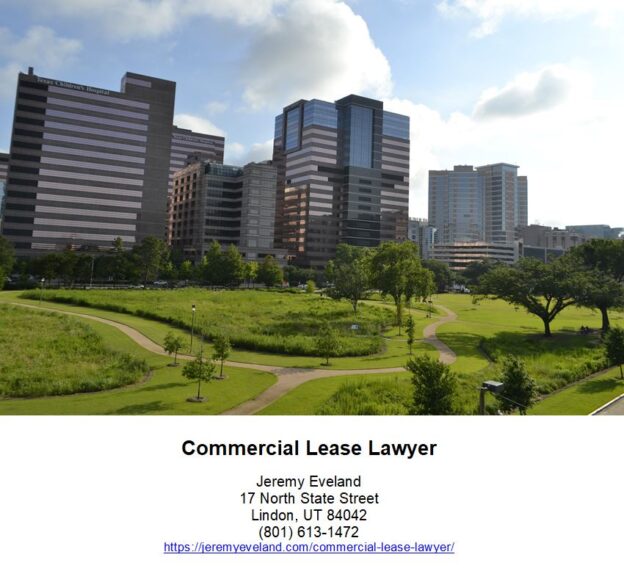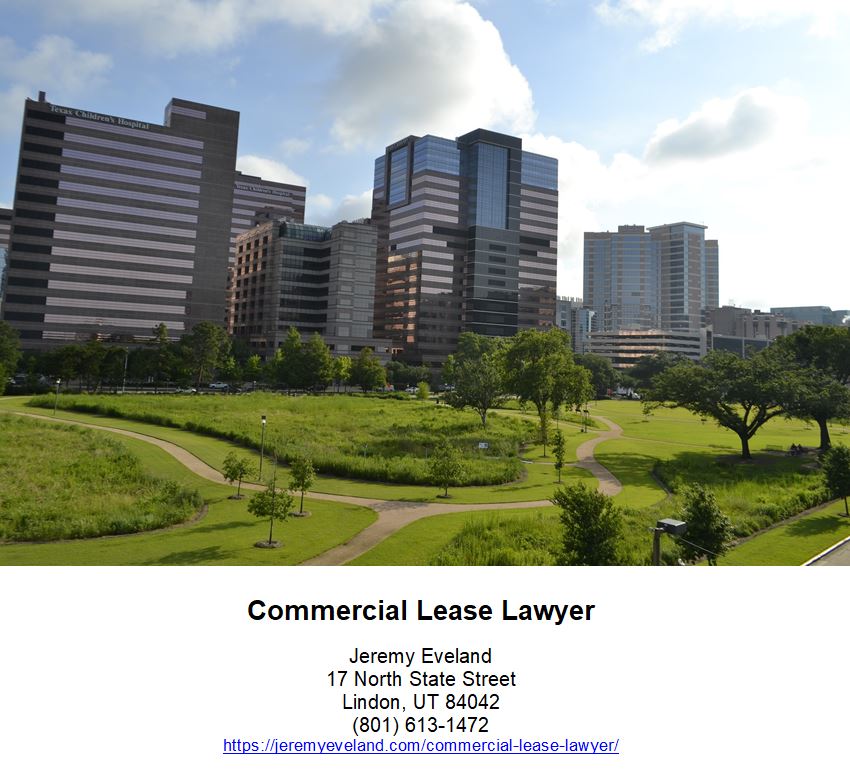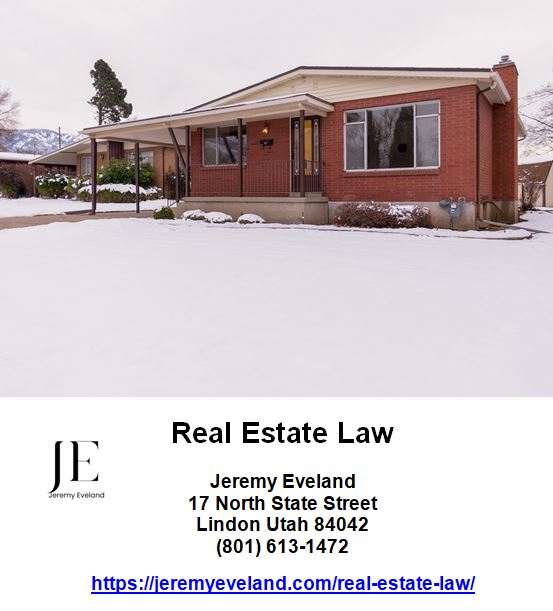Are you a commercial tenant in Utah looking to enter into a lease agreement? It’s important to fully understand the legal best practices surrounding this process to protect your rights and interests. In this article, we will explore the key considerations and guidelines when it comes to Utah lease agreements for commercial tenants. By familiarizing yourself with these best practices, you’ll be equipped to make informed decisions and ensure a smooth and fair leasing experience. Whether you’re establishing a new business or relocating an existing one, this article will provide the essential knowledge you need. Contact commercial real estate lawyer Jeremy Eveland for further assistance and consultation.

Lease Agreement Basics
Understanding the lease agreement
When entering into a lease agreement for commercial property in Utah, it is important to have a clear understanding of its terms and conditions. A lease agreement is a legally binding contract that establishes the rights and obligations of both the landlord and the tenant. It outlines crucial details such as the lease term, rent amount, payment schedule, maintenance responsibilities, and dispute resolution procedures. By thoroughly understanding the lease agreement, you can ensure that you are protected and aware of your rights as a commercial tenant in Utah.
Elements of a lease agreement
A lease agreement typically includes several key elements that are essential for both landlords and tenants. These elements include the names and contact information of both parties, the property description, the duration of the lease term, the rent amount and payment schedule, and any additional costs or fees such as utilities or maintenance. Additionally, the lease agreement should outline the rights and responsibilities of both parties regarding repairs, alterations, subleasing, renewal options, and termination procedures. It is crucial to carefully review each element of the lease agreement to ensure that all important aspects are clearly outlined and understood.
Common lease terms and clauses
Lease agreements often contain common terms and clauses that are important to be aware of. These terms and clauses can have a significant impact on your rights and obligations as a commercial tenant in Utah. Some common examples of lease terms and clauses include:
- Rent escalation clause: This clause outlines whether the rent will increase over time, and if so, by what percentage or amount.
- Holdover clause: This clause addresses the actions and consequences if the tenant remains on the property after the lease term has expired.
- Maintenance and repair clause: This clause specifies who is responsible for repairs and maintenance of the property, and how it should be coordinated and documented.
- Subleasing clause: This clause outlines whether the tenant is allowed to sublease the property to another party, and if so, under what conditions.
- Default and termination clause: This clause details the circumstances under which the lease can be terminated, such as non-payment of rent or breach of other lease terms.
- Renewal and termination options: This clause specifies the process and requirements for renewing or terminating the lease agreement at the end of the initial lease term.
Understanding these common lease terms and clauses is crucial to protect your interests as a commercial tenant in Utah. Thoroughly reviewing these elements and seeking legal advice if necessary can help ensure that you have a fair and mutually beneficial lease agreement.
Commercial Lease Laws in Utah
Overview of commercial lease laws in Utah
Utah has specific laws in place that govern commercial lease agreements and protect the rights of tenants. These laws outline the legal requirements and obligations for both landlords and tenants, providing a framework for fair and transparent lease agreements. It is essential for commercial tenants in Utah to have a good understanding of these laws to ensure that their rights are protected and upheld throughout the lease term.
Rights and obligations of commercial tenants
As a commercial tenant in Utah, you have certain rights and obligations that are protected by the law. These rights include the right to a habitable and safe property, the right to privacy, and the right to negotiate lease terms and conditions. At the same time, you also have obligations such as paying rent on time, maintaining the property in good condition, and complying with all lease terms and regulations. Understanding your rights and obligations as a commercial tenant is crucial for a successful leasing experience in Utah.
Eviction procedures for commercial tenants
In the unfortunate event that eviction becomes necessary, Utah has specific procedures in place for commercial tenants. The eviction process for commercial tenants typically involves providing written notice of the violation or breach, allowing the tenant an opportunity to remedy the situation, and pursuing legal action if necessary. It is important to consult with a commercial real estate lawyer if you are facing eviction, as they can guide you through the process and help protect your rights.
Negotiating a Commercial Lease in Utah
Identifying your needs and objectives
Before entering into a commercial lease agreement in Utah, it is important to identify your specific needs and objectives. Consider factors such as the size and location of the property, your business’s unique requirements, and your long-term goals. By clearly understanding your needs and objectives, you can negotiate a lease agreement that aligns with your business’s needs and sets you up for success.
Assessing the property and location
An essential step in negotiating a commercial lease in Utah is to thoroughly assess the property and its location. Consider factors such as the condition of the property, its accessibility, parking availability, proximity to your target market, and any potential zoning restrictions or limitations. By thoroughly assessing the property and location, you can make an informed decision and negotiate accordingly.
Understanding lease terms and conditions
Before signing a lease agreement, it is crucial to fully understand the lease terms and conditions. Review the lease agreement carefully to ensure that it aligns with your needs and objectives. Pay close attention to details such as the lease term, rent amount and payment schedule, maintenance and repair responsibilities, and any additional costs or fees. Seeking legal advice to review the lease agreement can provide you with invaluable insights and ensure that you are protected as a tenant in Utah.
Negotiating rent and other costs
One of the most critical aspects of negotiating a commercial lease in Utah is the negotiation of rent and other costs. It is important to conduct research and gather information about the current market rates for similar properties in the area. Armed with this information, you can negotiate a fair and reasonable rent amount with your landlord. Additionally, negotiate any additional costs such as utilities, insurance, or maintenance fees to ensure that they are reasonable and aligned with your budget.
By following these steps and effectively negotiating with your landlord, you can secure a commercial lease agreement in Utah that meets your needs and protects your interests.
Important Considerations for Commercial Tenants
Insurance requirements for commercial tenants
As a commercial tenant in Utah, it is essential to understand and comply with the insurance requirements set forth in your lease agreement. Commercial tenants are often required to carry liability insurance to protect against potential accidents or damages on the property. Additionally, the lease agreement may outline specific insurance coverage amounts or types that must be maintained throughout the lease term. It is important to review these insurance requirements carefully and ensure that you have adequate coverage to protect your business and comply with the lease terms.
Maintenance and repairs
Another important consideration for commercial tenants in Utah is the responsibility for maintenance and repairs. Lease agreements typically outline the responsibilities of both the landlord and the tenant regarding maintenance and repairs. It is crucial to understand these responsibilities and obligations to ensure that the property is properly maintained and that repairs are addressed in a timely manner. If the lease agreement does not clearly outline the maintenance and repair responsibilities, it may be necessary to negotiate and clarify these terms before signing the lease.
Subleasing and assignment of lease
Commercial tenants in Utah may sometimes have the need to sublease their space or assign the lease to another party. However, lease agreements often contain specific terms and clauses regarding subleasing and assignment. It is important to carefully review these provisions to determine if subleasing or assigning the lease is permitted, and if so, what conditions or restrictions apply. Seeking legal advice can help navigate these complex provisions and ensure that you are compliant with the lease agreement.
Renewal and termination options
Understanding the renewal and termination options outlined in your lease agreement is crucial for commercial tenants in Utah. Lease agreements often specify the process and requirements for renewing the lease at the end of the initial term, as well as the conditions under which the lease can be terminated early. By understanding these options, you can effectively plan for the future and make informed decisions regarding the continuation or termination of the lease.
By considering these important factors and seeking legal advice, commercial tenants in Utah can navigate their lease agreements more effectively and protect their interests.

Legal Protections for Commercial Tenants in Utah
Protections against unfair lease terms
Commercial tenants in Utah are protected by laws that prohibit landlords from including unfair or unreasonable lease terms in their agreements. These laws aim to create a fair and balanced relationship between landlords and tenants and prevent any exploitation or abuse. If you believe that certain lease terms are unfair or may be in violation of the law, it is important to consult with a commercial real estate lawyer who can assess your situation and provide guidance on potential legal remedies.
Tenant rights regarding habitability and safety
As a commercial tenant in Utah, you have the right to a habitable and safe property. This means that the landlord is responsible for providing a property that is free from hazards, in good repair, and compliant with applicable building codes and safety regulations. If you believe that your landlord is not meeting these obligations, you may have legal rights to demand repairs or take other appropriate action. Consulting with an experienced commercial real estate lawyer can help you understand your rights and determine the best course of action.
Remedies for breach of lease agreement
If either party fails to fulfill their obligations under the lease agreement, it can be considered a breach. Utah law provides remedies for breaches of lease agreements for commercial tenants, which can include monetary damages, specific performance (compelling the breaching party to fulfill their obligations), or lease termination. If you believe that the landlord has breached the lease agreement, consulting with a commercial real estate lawyer can help you understand your rights and pursue the appropriate legal remedies.
Knowledge of these legal protections is essential for commercial tenants in Utah, as they can help ensure fair treatment and resolution of any disputes that may arise during the lease term.
Dispute Resolution in Commercial Lease Agreements
Mediation and arbitration options
When disputes arise in commercial lease agreements in Utah, it is often advantageous to pursue alternative dispute resolution methods such as mediation or arbitration. These methods offer a more efficient and cost-effective way to resolve disputes compared to traditional litigation. Mediation involves a neutral third party who helps facilitate negotiations and find a mutually acceptable resolution. Arbitration, on the other hand, is a more formal process where an arbitrator makes a binding decision after considering the arguments and evidence presented by both parties. Utilizing mediation or arbitration can save time, money, and unnecessary stress for all parties involved.
Litigation process for lease disputes
In certain situations, litigation may be necessary to resolve a dispute in a commercial lease agreement. Litigation involves presenting the case in court, where a judge or jury will ultimately decide the outcome. While litigation can be a complex and time-consuming process, it may be the best option in cases where alternative dispute resolution methods have failed or are not feasible. It is important to consult with a commercial real estate lawyer who has experience with lease disputes to navigate the litigation process effectively and protect your interests.
By understanding the available dispute resolution methods and seeking legal advice, commercial tenants in Utah can work towards resolving any lease disputes in a fair and efficient manner.
Understanding Lease Modification and Extension
Modifying lease terms
Sometimes, commercial tenants in Utah may find it necessary to modify certain lease terms during the lease term itself. This can be done through a lease modification, which is a written agreement between the landlord and the tenant that outlines the changes to be made. Lease modifications can be used to adjust rent amounts, extend or reduce the lease term, or modify other terms and conditions. It is important to document any lease modifications in writing to ensure that both parties are clear on the changes and to avoid any misunderstandings or disputes in the future.
Extending the lease agreement
If both the landlord and the tenant are satisfied with the current lease agreement and wish to continue the tenancy beyond the initial term, they can choose to extend the lease agreement. This can be done through a lease extension, which outlines the new lease term, any changes to rent or other terms, and any additional conditions or requirements. It is important to address the extension of the lease agreement before the initial term expires to avoid any disruptions or uncertainties in the tenancy.
Renegotiating lease terms
As the end of the lease term approaches, commercial tenants in Utah may choose to renegotiate certain lease terms. This can be an opportunity to discuss and potentially modify rent amounts, lease duration, or other terms and conditions. It is important to approach lease renegotiations strategically and be prepared with market research and other relevant information. Seeking legal advice can also provide valuable insights and guidance throughout the renegotiation process.
By understanding lease modification and extension processes, commercial tenants in Utah can navigate these important aspects of their lease agreements effectively.
Complying with Zoning and Use Regulations in Utah
Understanding zoning laws and restrictions
Zoning laws in Utah dictate how specific areas of land can be used, including residential, commercial, industrial, or mixed-use purposes. It is important for commercial tenants to understand the zoning laws and restrictions in their specific location to ensure that their business activities comply with the designated zoning. Failure to comply with zoning laws can result in penalties, fines, or other legal consequences. Consulting with a commercial real estate lawyer can help you understand the zoning laws and restrictions applicable to your property and ensure compliance.
Applying for necessary permits and licenses
In addition to complying with zoning laws, commercial tenants in Utah may also need to obtain permits and licenses to operate their businesses legally. Different types of businesses may require specific permits or licenses, depending on the nature of their operations. It is crucial to research and identify the necessary permits and licenses for your business and ensure that you obtain them before commencing operations. Failing to obtain the required permits or licenses can result in legal consequences and potential disruption to your business. Consulting with a commercial real estate lawyer can help ensure that you have a clear understanding of the permits and licenses required for your business.
By understanding and complying with zoning and use regulations, commercial tenants in Utah can operate their businesses legally and avoid potential legal issues.

Commercial Lease Renewal and Termination
Renewal options for commercial tenants
When the initial lease term is approaching its end, commercial tenants in Utah may have the option to renew their lease agreement. The lease agreement should outline the process and requirements for renewal, including any notice periods or conditions that must be met. It is important for commercial tenants to carefully review these renewal options and consider their business’s future needs and goals. Renewing the lease can provide stability and continuity for the business, whereas choosing not to renew allows for flexibility and the opportunity to explore other options.
Termination and notice requirements
In some cases, commercial tenants in Utah may need to terminate their lease agreement before the end of the initial term. Lease agreements typically outline the termination process, including any notice requirements or penalties for early termination. It is important to review these provisions carefully and follow the agreed-upon procedure to minimize any potential legal or financial consequences. If termination becomes necessary, consulting with a commercial real estate lawyer can provide guidance on the best approach and help protect your interests.
Early lease termination
Sometimes, unforeseen circumstances may require commercial tenants in Utah to terminate their lease agreement before the end of the initial term. These circumstances can include financial hardships, changes in business operations, or other factors that make it impractical or impossible to continue the tenancy. Early lease termination can be a complex process, and it is important to consult with a commercial real estate lawyer who can guide you through the legal requirements and potential implications.
By understanding the renewal and termination options in your lease agreement, you can make informed decisions that align with your business’s needs and goals.
Seeking Legal Advice for Commercial Lease Agreements
Importance of consulting a commercial real estate lawyer
When navigating the complexities of commercial lease agreements in Utah, it is crucial to consult with a commercial real estate lawyer. A lawyer who specializes in commercial real estate can provide invaluable guidance, review lease agreements to protect your interests, and ensure that you comply with all laws and regulations. They can also assist with negotiating lease terms, resolving disputes, and advising on important legal considerations throughout the lease term.
What to consider when choosing a lawyer
When choosing a commercial real estate lawyer, it is important to consider their experience, expertise, and reputation. Look for a lawyer who has a deep understanding of commercial lease laws and regulations in Utah, as well as a track record of successfully representing clients in this area. Additionally, consider their communication style, availability, and fees to ensure that they are a good fit for your specific needs and objectives.
How a lawyer can assist with lease negotiations and disputes
A commercial real estate lawyer can play a crucial role in lease negotiations and dispute resolution. They can review lease agreements, identify potential risks or issues, and negotiate on your behalf to protect your interests. In the event of a dispute, a lawyer can provide expert advice, guide you through the legal process, and represent you in negotiations, mediation, arbitration, or litigation. Their expertise and knowledge of commercial lease laws can help ensure that you navigate lease agreements more effectively and achieve the best possible outcome.
By seeking legal advice from a reputable commercial real estate lawyer, commercial tenants in Utah can gain peace of mind and confidence in their lease agreements.





























